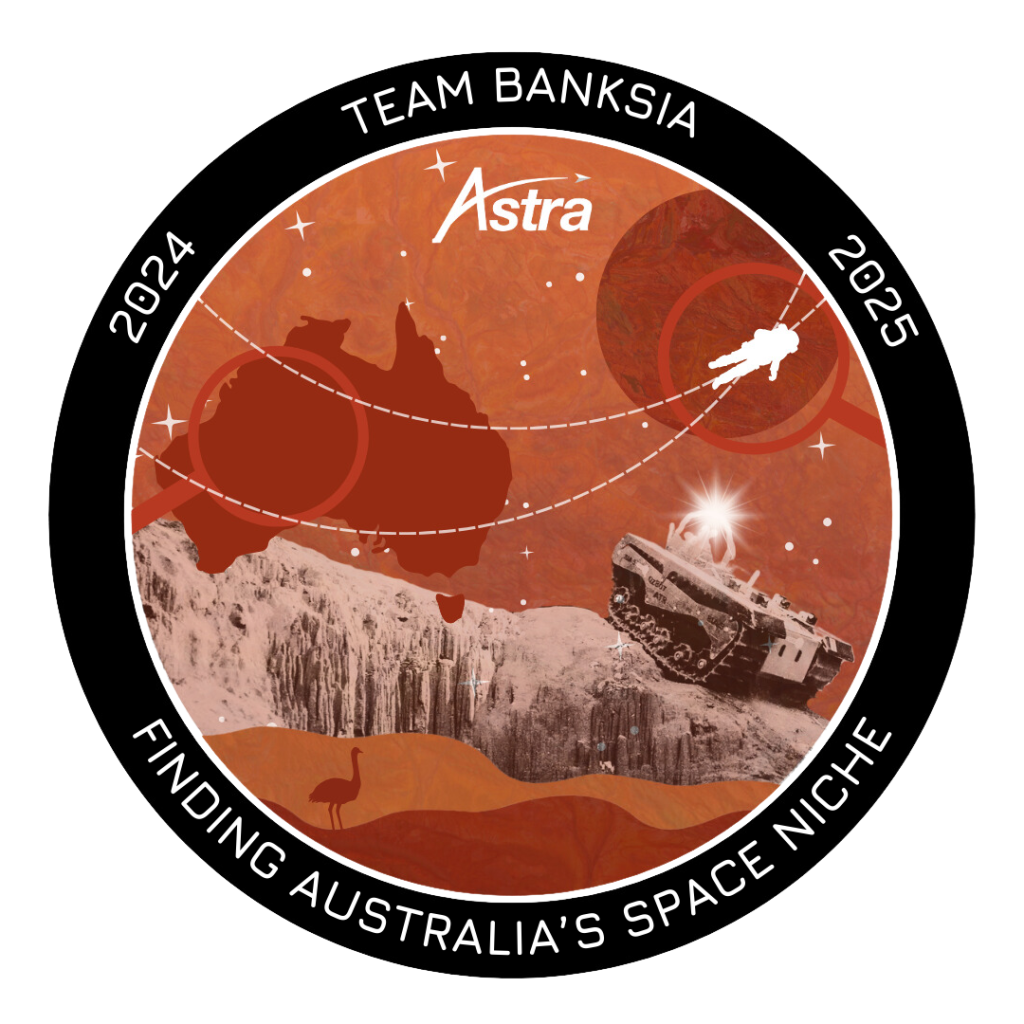Astra Alumni Article Series: Interview with Grace Rosier
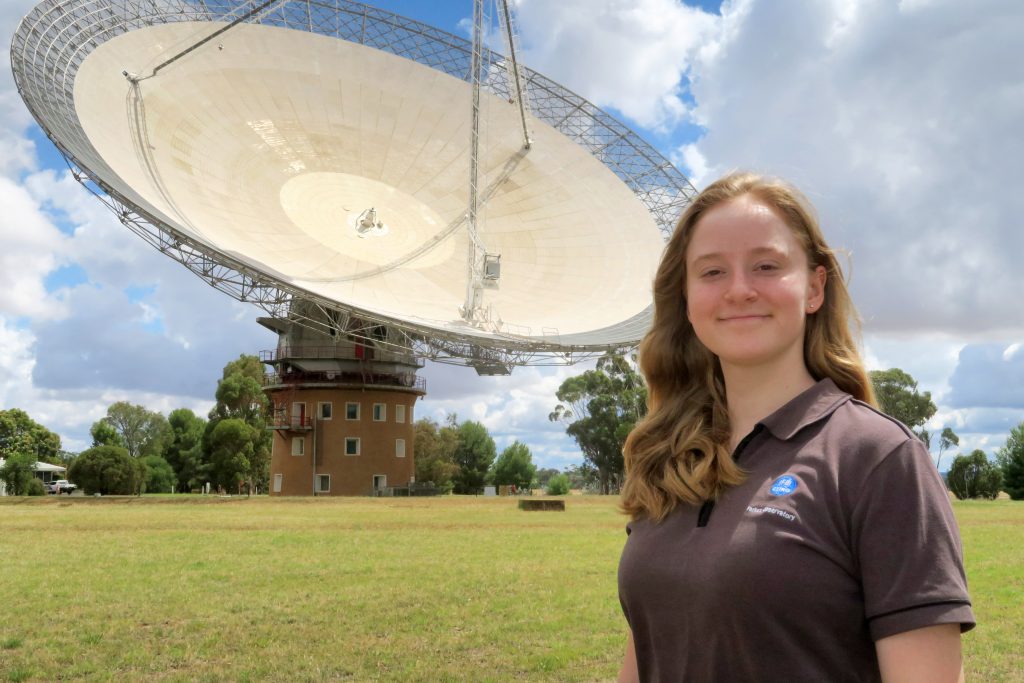
Our Astra participants come from various backgrounds and they bring in diverse experiences into the program. Their versatile profiles and their passion for space can serve as inspiration for future Astra participants and for any young space enthusiast.
In this article series, we are aiming to shed some spotlight on our Astra alumni – their career journeys, childhood inspirations, achievements and learnings from the Astra program that they are excited to share with our space-loving Astra community.
For our first article of this series, we interviewed Grace Rosier, 2024/2025 Astra program participant and member of the Banksia team.
Please note that in this article, the initials 'AS' refer to our interviewer, Anjalee Senarath, and the initials 'GR' refer to our interviewee, Grace Rosier.
AS: We’ll start with an introduction to yourself, we’d love to know more about your educational/professional background and what you’re involved in at present.
GR: I’m a full time university student, I’m currently in my fifth year studying a Bachelor of Science (Astronomy and Astrophysics) and a Bachelor of Engineering (Honours) (Mechatronics) at Macquarie University.
While being fully engaged in my studies, I also served as the 2024 President and Social Media Manager of the Macquarie University Physics and Astronomy Society. I’ve gained some absolutely amazing experiences through this society by volunteering at outreach events such as Astronomy Open Nights, Faculty Experience Days and most notably at the Communicating Astronomy with the Public international conference – it’s a lot of learning and fun.
Apart from that I also work as a student ambassador for the Faculty of Science and Engineering where I help the process of promoting various opportunities for students such as networking possibilities, career fairs and social events.
Between balancing my education and the volunteering work I do, I love going for runs during weekends and playing the piano!
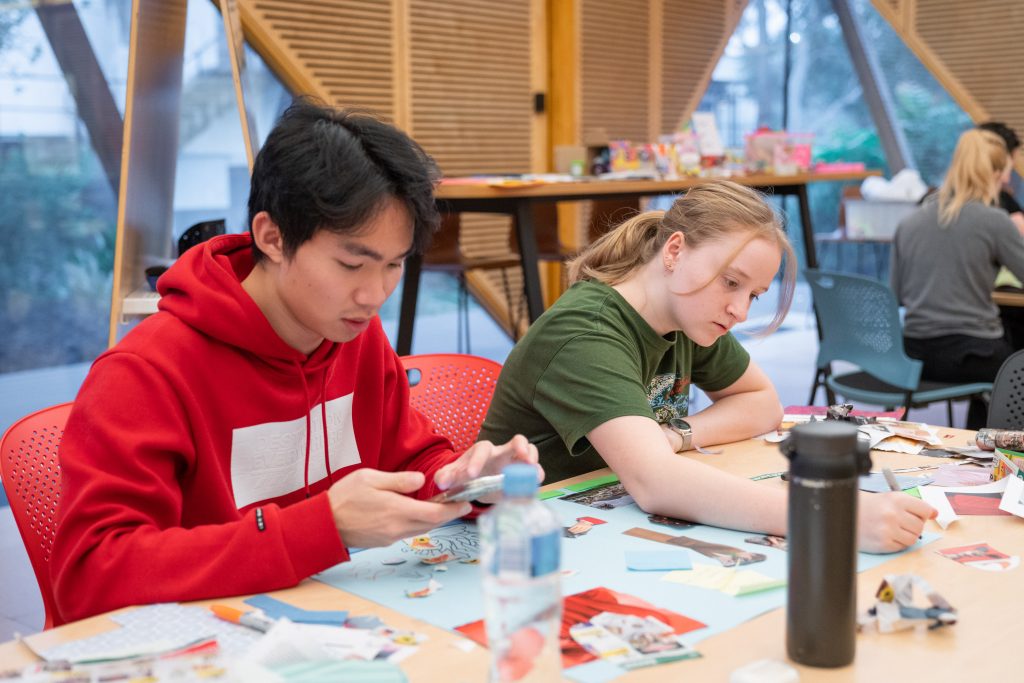


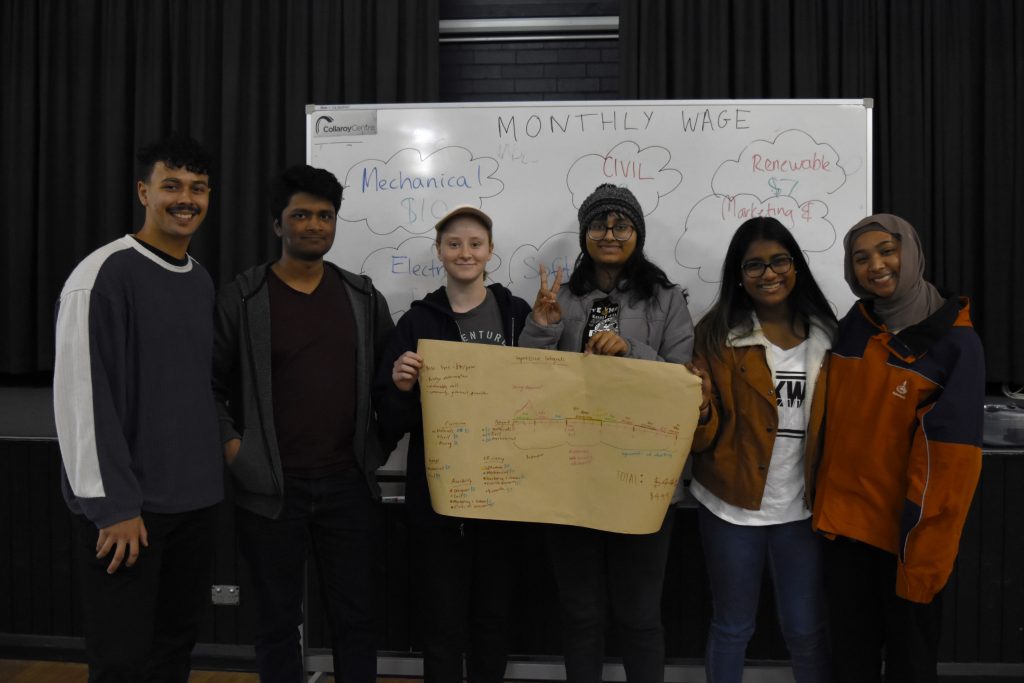
AS: It goes without saying that you’re absolutely in love with space. For most of us, our passions are fueled as a result of some significant early childhood experience. Was this the case with you? What initially sparked this interest? We’d love to know how this obsession with space started.
GR: I can guarantee that I have been very interested in space from a young age thanks to the fact that you can just look up at the sky and see! When I was a child, I remember my dad taking me out at night for walks and he’d point up to the Moon in the sky, and I remember being so fascinated. It’s no surprise that my first word was Moon!
As I grew up I started enjoying astronomy all throughout high school, but it wasn’t until the HSC that I decided it was an area that I wanted to specialise in. I loved Math and Physics classes during my HSC and realised that studying astronomy at the university would combine both of those topics. When I was accepted into an astronomy major, I was ecstatic, and my passion for space has only grown since.
AS: That’s an endearing story, you’ve proved that night walks and moon watching can mould a child into a future space enthusiast! When we take a look at the space industry, there’s so many figures that have contributed/ keep contributing to this field, and there are so many youngsters out there watching their moves and being encouraged to pursue a career in space. Who or what has been your biggest inspiration in the space industry?
GR: Last year I had the honour of meeting Katherine Bennell-Pegg and attending her interview at The University of Sydney. It was extremely inspiring to hear her career journey from being a student to being Australia’s first female astronaut.
What excited me the most was how similar her early career was to mine! She completed a double degree in engineering and science and completed a project with Engineers Without Borders, an organisation that I have been involved in the past. That was certainly a significant meetup for me, and it encouraged me to be super positive and stay motivated about the future and the endless opportunities I could have.
AS: Thanks for sharing that moment with us Grace. Now let’s delve into a futuristic question: If you could travel to any planet or celestial body, which one would it be and why?
GR: I would love to visit the substellar object J1407b! It was discovered in 2007 when its massive circumplanetary rings eclipsed a star and dimmed it for around 56 days. I think the view of the sky from the surface of this young giant planet would be absolutely magnificent because its rings are about 640 times bigger than Saturn’s! It’s also known as Super-Saturn for this very reason.
AS: What excites you most about the future of space?
GR: I am very excited to see how the development of new technology will advance the space industry. How will it benefit the industry? Stronger telecommunication systems, larger radio telescope arrays or clearer field-of-views? I think in the coming few decades, the field of space and astronomy will gain great advantage from new and emerging tech and unique innovations, and I look forward to seeing where they take us!
Grace presenting interactive talks at CSIRO
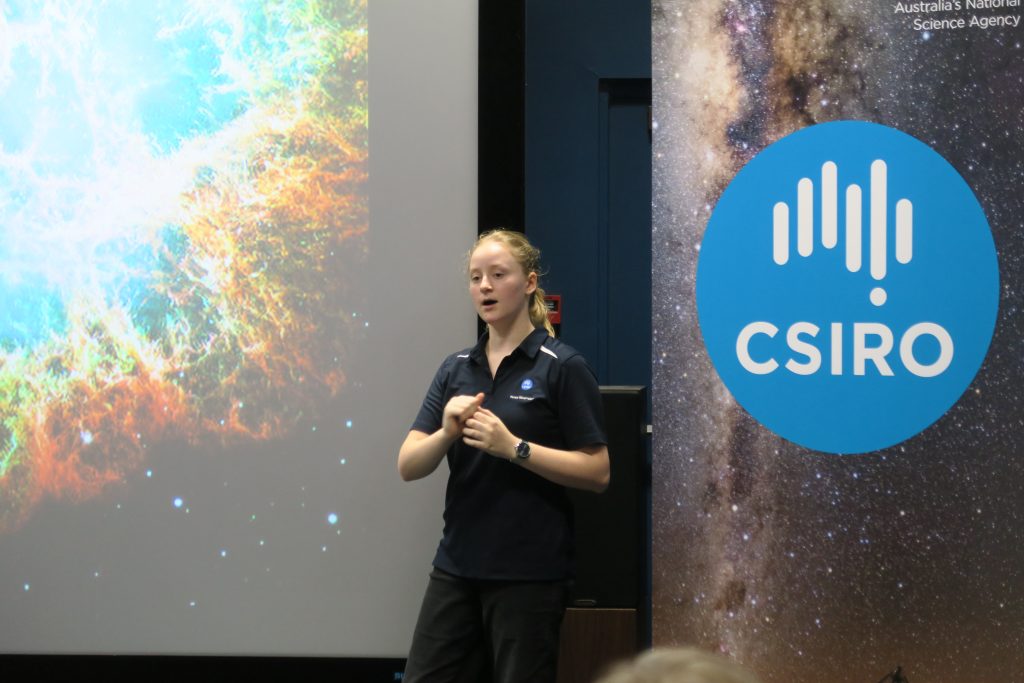
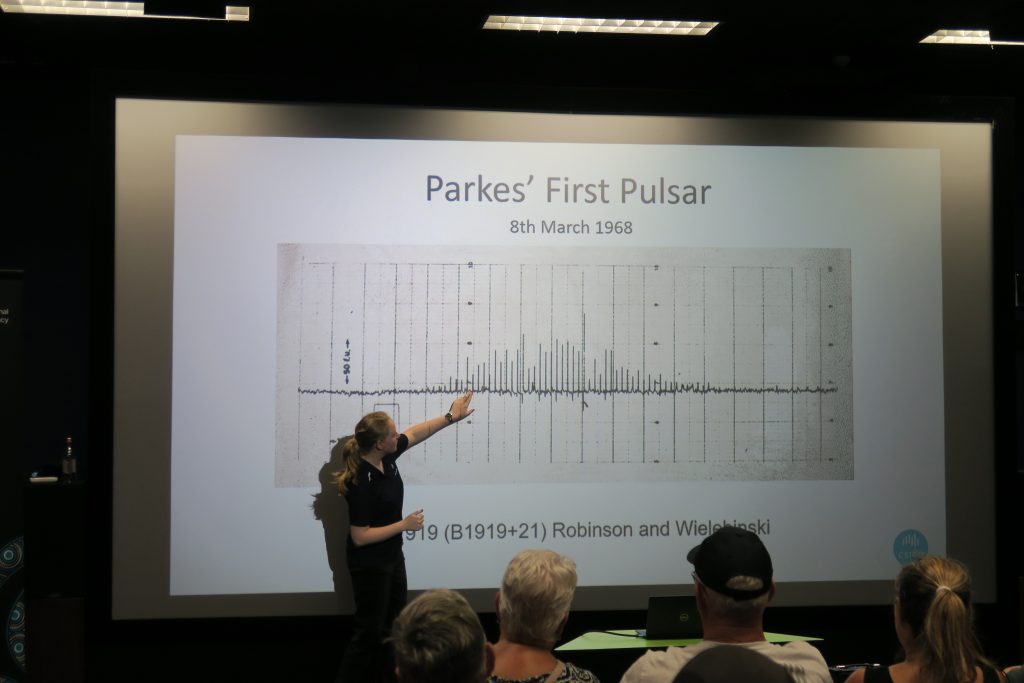

AS: True, the future of the space industry does look very promising and we’re grateful to be a part of that movement where we can aspire young minds to take over that bright future. Let’s talk about your future and your goals. There are plenty of people who are space enthusiasts on the side but end up becoming successful in a totally different field of work. How about yourself? Are you planning to pursue a career in space? If yes, is there any specific role or field that you are interested in/ or currently working in?
GR: Well I’m very much still learning and there’s so much to learn everyday. As I am currently a student, the projects that I have worked on involved topics such as spectrometry, star life cycle simulation, exoplanets and utilising astronomy databases. I have also been involved in different internships and programs which have given me insights into this field.
In 2023, I interned at the Parkes Radio Observatory with CSIRO, where I presented interactive talks on the telescope’s significant contributions to pulsar research, through which I also discovered that I’m interested in gravitational waves.
In 2024, I conducted literature reviews with Australian Astronomical Optics for a research project on the European Southern Observatory’s Very Large Telescope on the effect of cosmic rays on astronomical instrumentation. I also have some engineering experiences which includes completing an internship in acoustic consulting, participating in design events with Engineers Without Borders and being the inaugural recipient of the 3 year Phillip Riley Scholarship in Renewable Energy. I’m also currently a participant in the Achieved Competition by the Space Generation Advisory Council.
In 2024, I also worked on a project which studied near-Earth objects using the Australia Telescope Compact Array. This sparked my interest in near-Earth object research and I particularly enjoyed researching case studies for Astra Program’s white paper that was related to this area. Since this, I have been interested in pursuing research in this field and hope to contribute to another research project like this in the near future.
AS: Pursuing a career in space doesn’t come without its challenges – there can often be moments of self-doubt, feeling unaccomplished and always wanting to push yourself to do more, despite whatever you’re doing. What challenges have you faced in working toward a career in the space industry & how have you overcome these challenges so far?
GR: The biggest challenge that I have overcome while working towards a space career has been the difficulty in finding domestic opportunities for students. Australia’s space research sector significantly contributes to ground-breaking developments, however, there are limited opportunities for undergraduate students to get into industry internships or research positions.
Last year I got this amazing opportunity to intern at the Parkes Radio Observatory with CSIRO’s highly competitive program. It never hurts to send in an application even if you believe there may be stronger candidates, because it might turn out that you are the one! It can be difficult sometimes to believe in your strengths and capabilities when this field is so competitive with limited opportunities, but believing in yourself does matter a lot in the end. I have started applying to international internships, as I believe that globally expanding my search will open up a larger number of opportunities that I otherwise wouldn’t have access to.
Grace during her internship at the Parks Radio Observatory
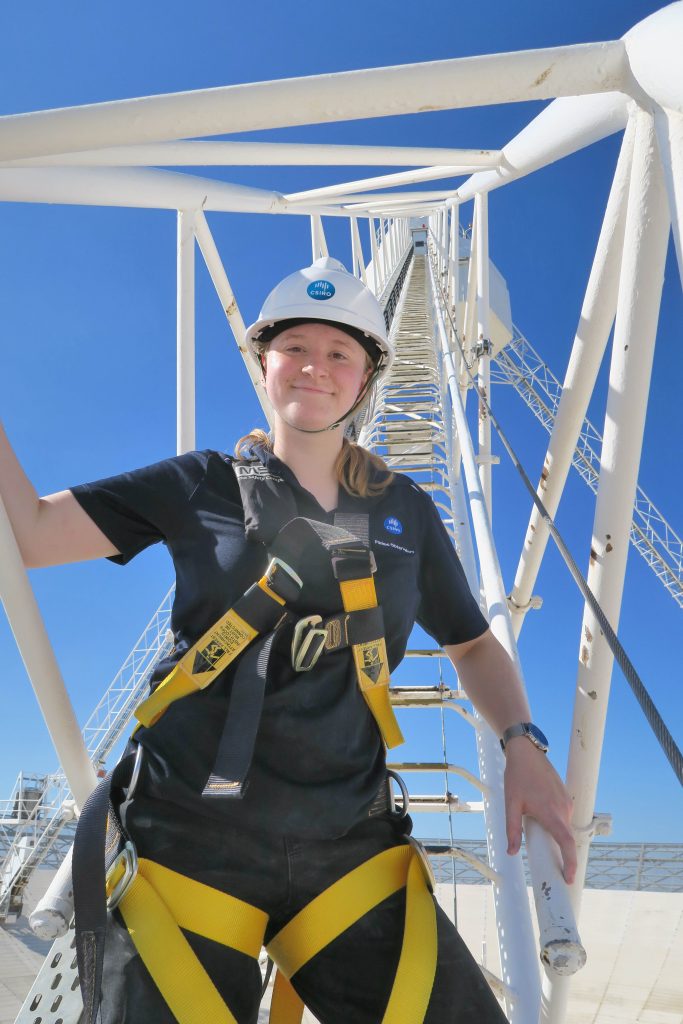


Image credit: John Sarkissian.
AS: Just like you mentioned, believing in your own superpower is an absolute necessity to progress through challenges, especially in this industry. Can you share with us some of your personal strengths and skills that you believe will help you achieve your space-related goals?
GR: I think I’m a good communicator. My science communication experience has strengthened my ability to confidently speak in environments such as class presentations and large conferences. I believe this will greatly assist me when I am required to present research findings or network with students and professionals.
In addition, I’m always open to learning, and I take feedback with a positive approach. I think this receptiveness to feedback will prove valuable when I contribute to future space research projects where it is imperative that for the final product to be of high standard, well received feedback and improvements are essential. I have also learnt from my engineering experience that I’m able to give attention to specific details, individual components as well as the big picture – as in the whole integrated system at the same time, and this is a very important aspect in space designing and I think it’s one valuable skill I possess.
AS: In the space industry, receiving guidance from an expert can create a lasting impression. It might not be immediate, but seeing how this field evolves, someone’s helping hand, support and advice could potentially help future space professionals create a positive impact on the whole of mankind years from now. If you could receive mentorship from any space industry professional, who would it be and why?
GR: Like I mentioned before, I loved meeting Katherine Bennell-Pegg in person and I would be absolutely thrilled to be mentored by her. She is an incredible inspiration to women in the space industry. I will love to hear about projects she worked on and how she utilised her early-career network so that I can use it as a blueprint for paving my own unique path. I would love to learn from her unique industry experience and strengthen the technical skills I would need to work in the engineering & design side of this industry.
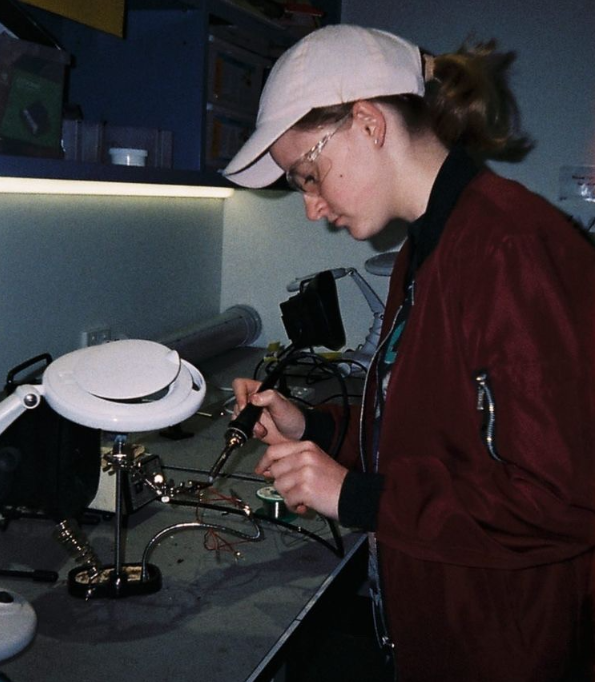

AS: How do you see yourself contributing to the future of the space industry of Australia in the next 5–10 years?
GR: In the coming years I would love to engage more in research, whether in astronomy or engineering design. I then intend to work in the aerospace field creating innovative designs for spacecrafts or working at launch facilities where I can enjoy the excitement inside a control room, surrounded by fellow space professionals. I would like to make contributions to space education by engaging in outreach at schools and universities, by sharing my own passion and career journey and encouraging the next generation of women to boldly pursue their passion for space.
AS: That sounds like an amazing 5 year strategy. How has Astra helped you move closer to your space-related career or personal goals?
GR: The Astra Program has shown me different career paths in the space sector that I can pursue, that I otherwise wouldn’t have been aware of. The Subject Matter Expert talks allowed me to gain industry insight into space careers and into the history of Australia’s space achievements. I had the opportunity to lead the creation of my team’s infographics which has deepened my skills in project management and communication. By significantly contributing to a white paper supported by the Australian Youth Aerospace Association, I took the first step in establishing my public profile, it was all a great experience.
AS: As vast as it is, how would you describe what space means to you in just one sentence?
GS: An opportunity to combine my engineering skills with my passion for astronomy!
AS: If you could give one piece of advice to someone interested in space, what would it be?
GR: Get involved with opportunities as early as you can! I started from being a member of a university society to interning at a radio telescope facility in less than 4 years. Each opportunity that you take opens a door to another one and the earlier you do it, the quicker your career will progress.
AS: I think that anyone who pursues a career in the space industry are big dreamers before they become anything else, and that’s what takes them that far. What is your biggest dream related to space, and what steps are you taking to achieve it?
GR: My biggest dream would be to work in a control room at a launch site or a space agency because it seems exciting and would provide me with a high-level of responsibility. I love that! My astronomy and mechatronics degrees will equip me with the required knowledge and experience. After completing my undergraduate degrees, I intend to start a Masters degree in a field like aerospace engineering which will allow me to further understand the development of spacecrafts and how they are launched and operated.

About the Author - Anjalee Senarath
Anjalee is a passionate skygazer who fell in love with the starry skies when she was a kid. Over the years, she has developed a liking for Physics and completed her Bachelor of Physics with Honours. Anjalee has worked as a technical writer, creative writer, business analyst and a projects manager. She is interested in science communication and sharing science with communities – which is one of the reasons that got her into Astra. When she’s not doing anything sciencey, she likes to go beach hopping, read a good book or take long walks in the sun.
This article is apart of an ongoing series: Astra Alumni Articles
